LPCmini
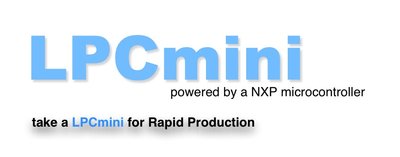
LPC1768 design without Ethernet
Technical datas
- same pinout as the mbed (but without Ethernet)
- power via USB or external power source
- 5.0 VDC from USB available on pin VU
- ISP programming via USB (FT232RL)
- On-board LED's and serial USB port for debugging
- On-board LED's for TXD/RXD
- Reset and ISP-enable switch
- 0.1 Inch 40-pin DIP package to use it on breadboard's or stripboard's
- LPCmini can be used on the LPCXpresso EABaseBoard from Embedded Artists
- low-cost 2-sided PCB design !!!
- DIY parts assembly/soldering possible
- Supply current 60 mA; code "while(1){ }" executed from flash
- board size 54 mm x 28 mm
- PCB design is licensed under the TAPR Open Hardware License (www.tapr.org/OHL)
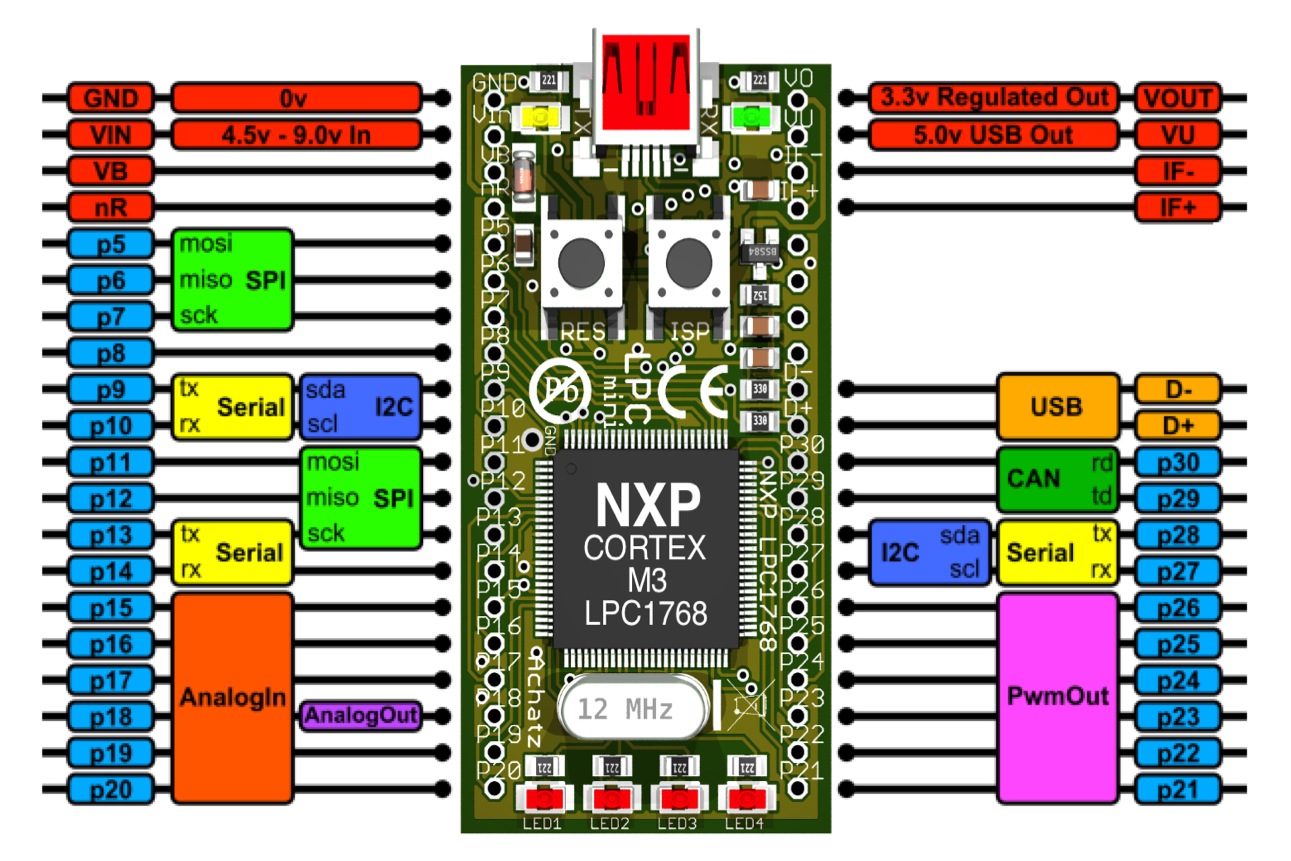
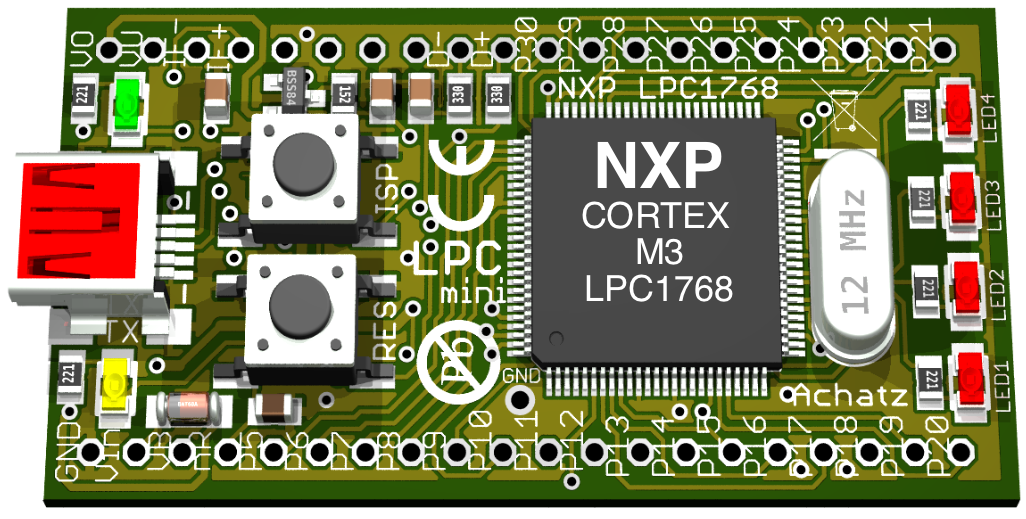
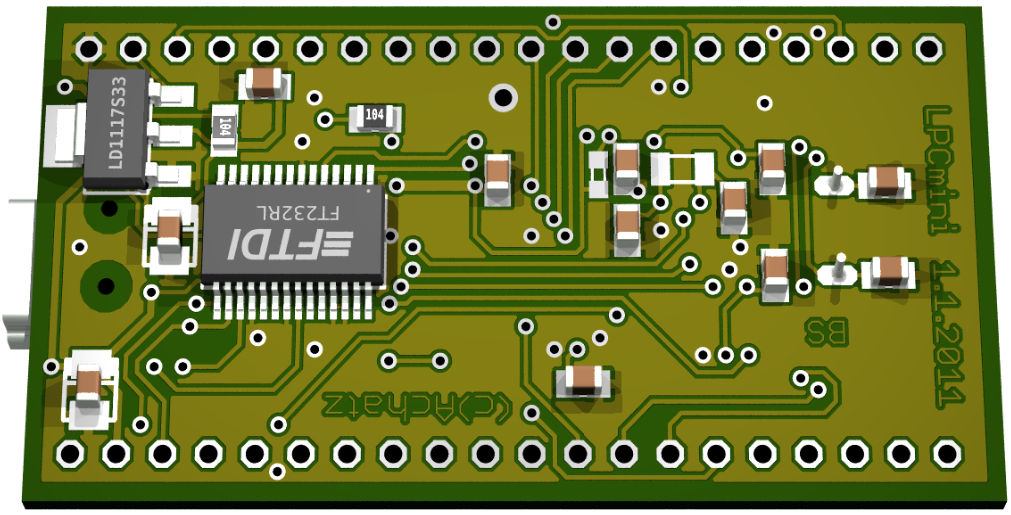
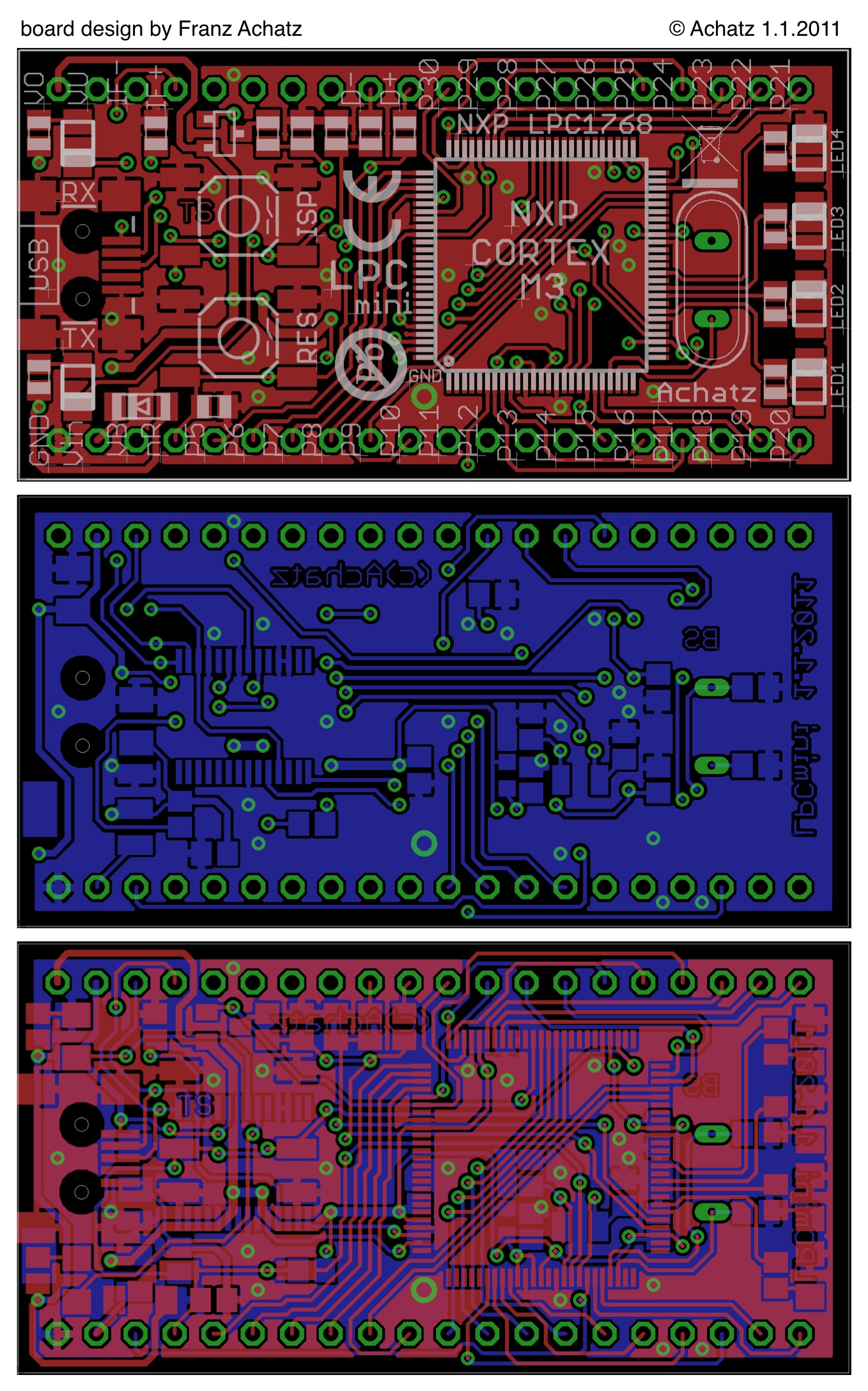
Schematics
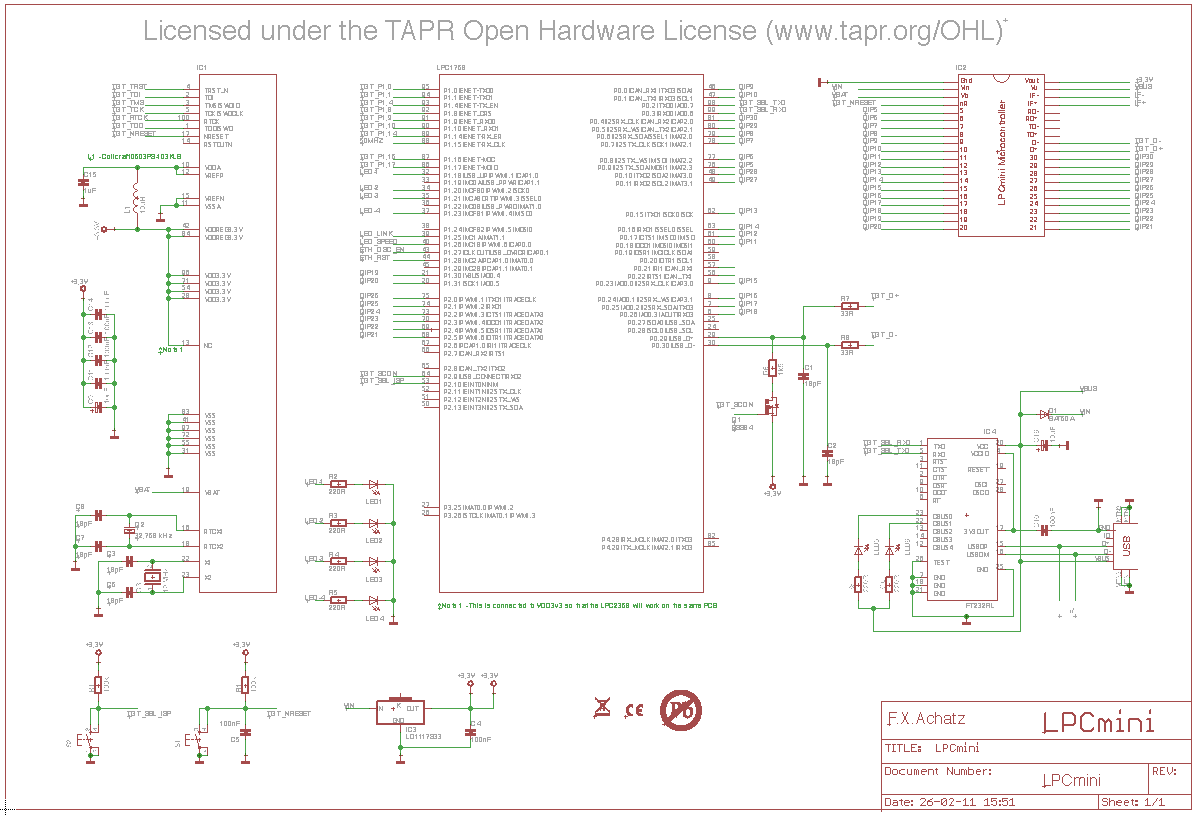
BOM

update 9.3.2011: The reset cap C5, located next to the reset switch (100 nf), should be replaced by a 1 uf tantalum capacitor !!!
PCB Layout
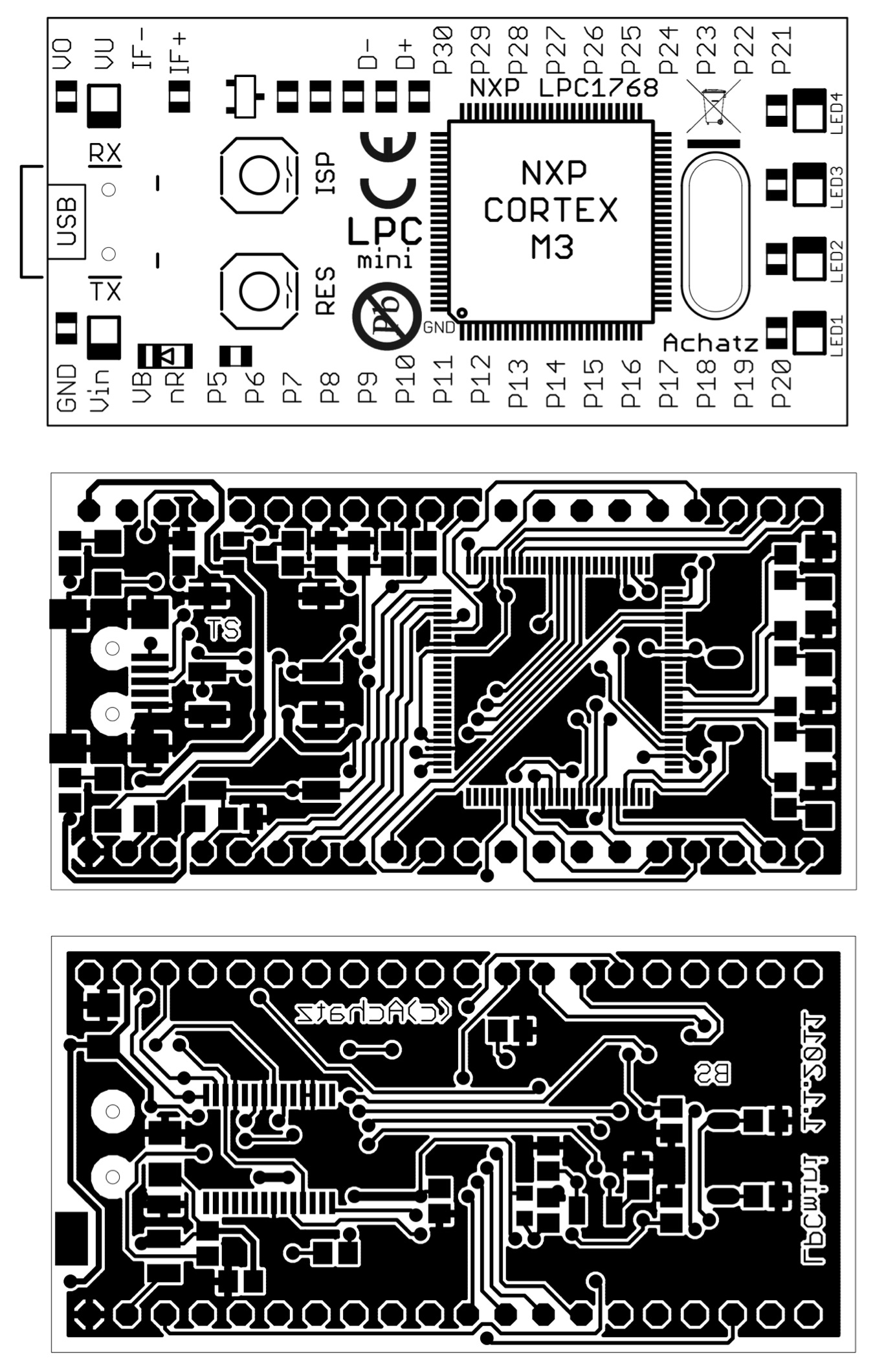
Application
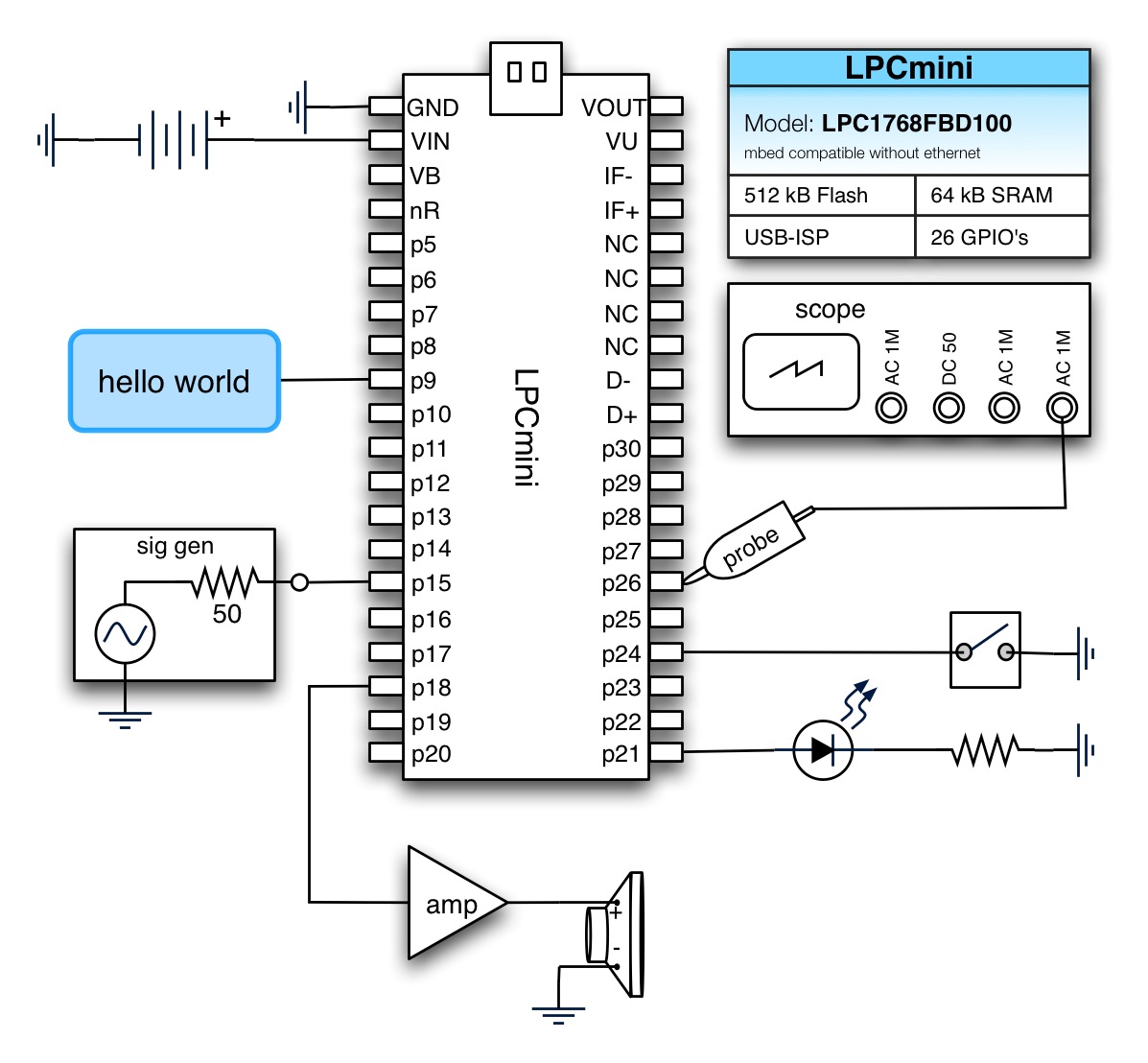
some real photo's, this time
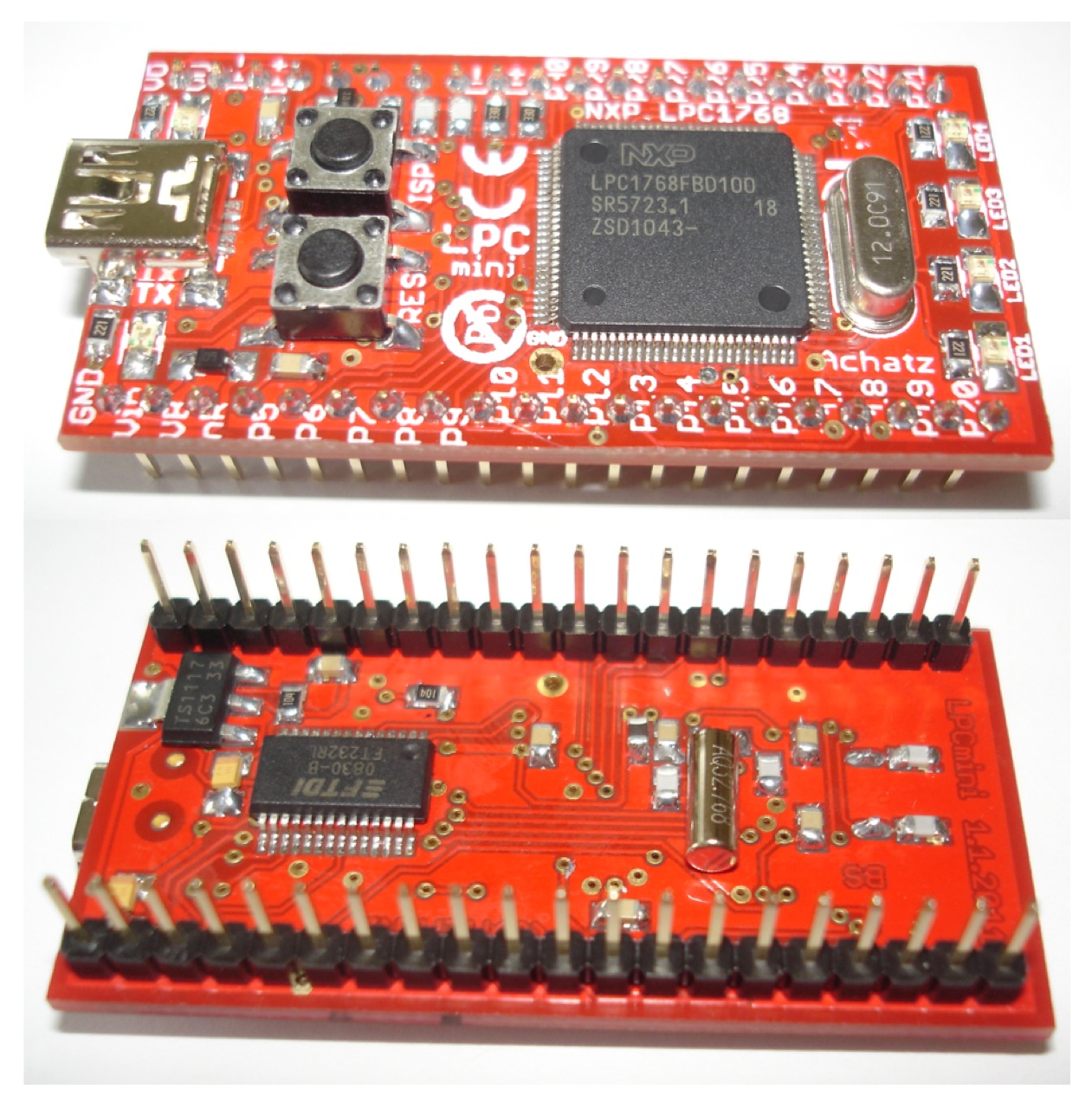
small LPCmini production :-), oh, but not the two mbed's !!!

DS18S20 Application running
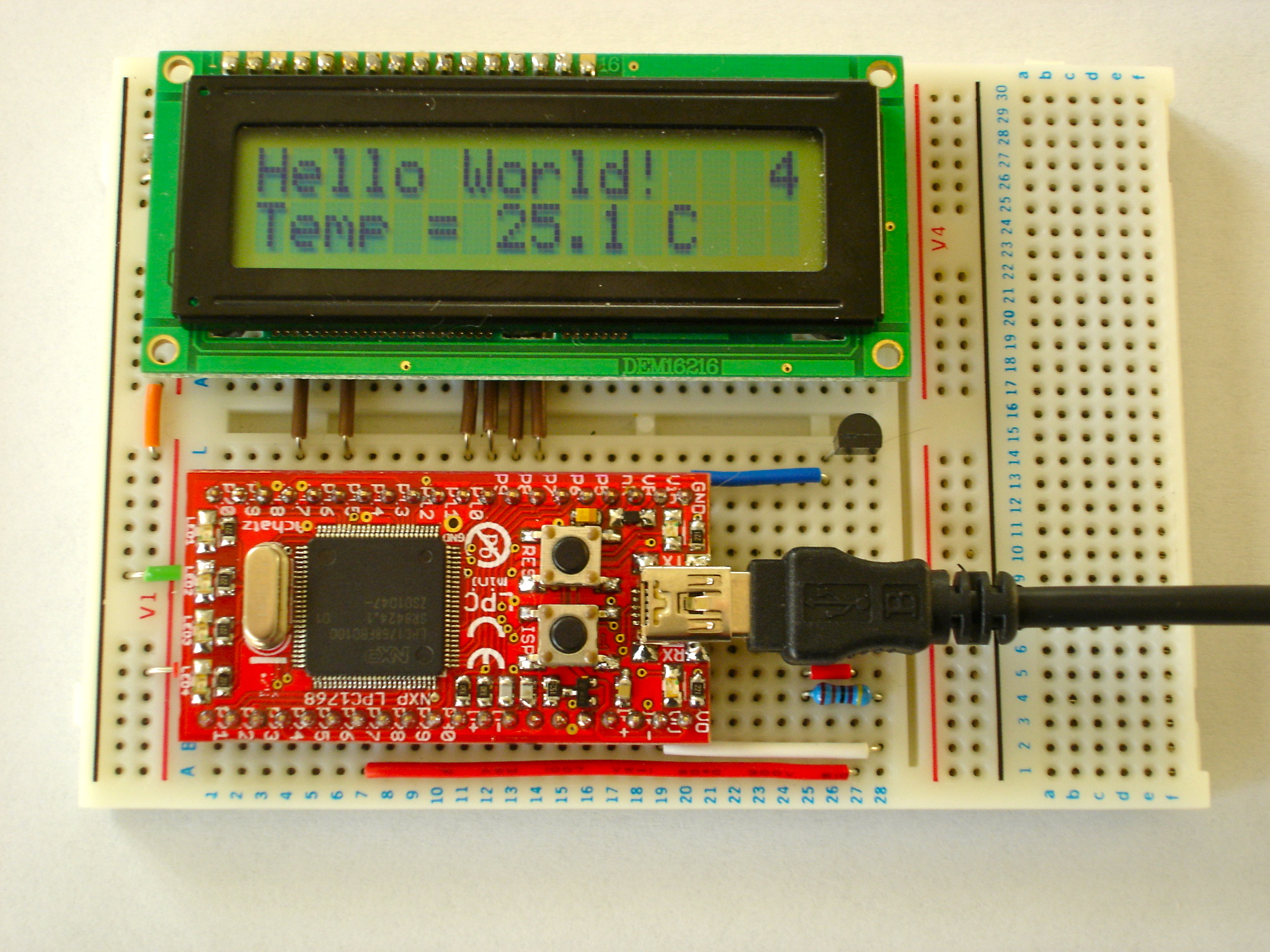
a nice flash-tool (lpc21isp) for my Mac and it's very fast :-)
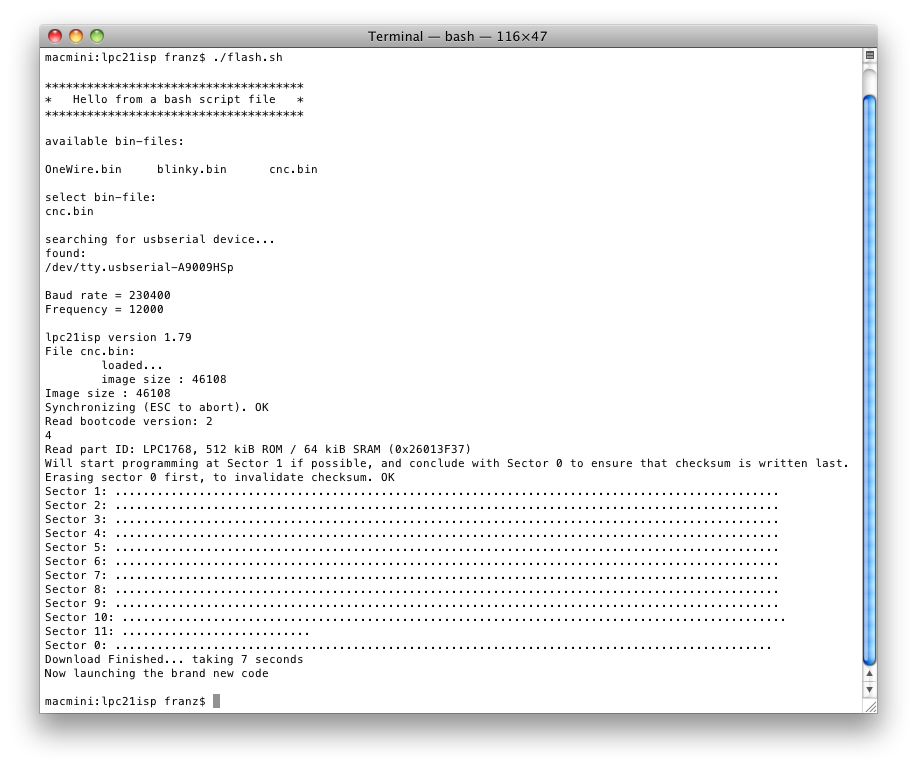
some bad scripting :-(

Hi Ben,
please let me first get some boards made in China for testing the design.
This will take about 2 or 3 weeks from now.
I will keep you informed.
have fun
Franz
I would also like to have some. Please keep me updated. Thanks.
How can I program this board,
do I need a special programmer?
will the MBED compiler still be able to generate code for it ?
Could the 6 pins ( 33 ..38) be connected to other pins on the processor ?
Cheers
Ceri
How can I program this board,
do I need a special programmer?
will the MBED compiler still be able to generate code for it ?
Could the 6 pins ( 33 ..38) be connected to other pins on the processor ?
Cheers
Ceri
programming works via ISP. See this link:
http://mbed.org/cookbook/Prototype-To-Hardware
#
04 Feb 2011 . Edited: 04 Feb 2011
Franz, definitely interested in some boards. Please keep me posted (sales@ohararp.com).
Hi Ohararp,
pcb's and all parts are ordered.
Keep you informed.
have fun
Franz
Are you going to have some for sale?
If so how much, to send to UK.
Mainy thanks
Ceri.
Hi Ceri,
i will offer some handmade LPCmini's for sale.
The price should be less than 30 Euro, i think.
But i am planning to keep this LPCmini project "open source" in a way that i publish all needed CAD files here at mbed.org
or at a different web-page for downloading. Then the LPCmini design will be free for hobbyist, schools and universities.
Only commercial use of the LPCmini needs my permission.
have fun
Franz
#
08 Feb 2011 . Edited: 08 Feb 2011
Franz, I read over the ISP tutorial link you posted. How are you planning to driving the nreset and isp pins using the ftdi chip?
Pull nReset low to put the LPC1768 into reset
Pull the ISP pin (P0.14) low, to indicate the ISP is intended
Pull nReset high. The LPC1768 comes out of reset and samples the ISP pin. If it is low, the bootloader runs
Edit: It looks like you'll be using the 2 hardware buttons on the chip to do this.
Franz, I read over the ISP tutorial link you posted. How are you planning to driving the nreset and isp pins using the ftdi chip?
Pull nReset low to put the LPC1768 into reset
Pull the ISP pin (P0.14) low, to indicate the ISP is intended
Pull nReset high. The LPC1768 comes out of reset and samples the ISP pin. If it is low, the bootloader runs
Edit: It looks like you'll be using the 2 hardware buttons on the chip to do this.
Yes, this is correct or you could use NXP's appnote AN10866 LPC1700 secondary USB bootloader :-)
Would you mind sharing a full resolution schematic image?. Congratulations on your project.
I was thinking of doing something similar but even simpler. I mean, something that can be used in small scale production. Maybe just leave only the LPC1768 and the Xtal, and put everything else (FT232, regulator) in another PCB (a "programming PCB"). That way you can just have only one programmer and several mini "mbeds". It would be almost like a DIP adapter but with the oscillator and prepared for in-circuit programming.
I tried to request some LPC1768 samples from NXP but they will not ship them unless you're a "customer with direct marketing agreements". I hate being in this position. I would like to continue using NXP microcontrollers but they are not making things easy. I mean, the mbed is fantastic, but it is expensive. And the LPC1768 is amazing and cheap but it is not available in my country (this is not their fault, I know). They should have a samples politic like Texas Instruments or Maxim does.
Anyway, I was just expressing my frustration of loving this uC but being not able to use it so easily in my country.
Hello Gonzalo,
you should checkout this link:
http://www.digikey.com/ar/en/DigiHome.html?wt.z_afil_site=ar&wt.z_afil_link=hp_toggle_en
LPC Microcontroller are available in your country via DigiKey.
Yes, i will post my CAD files later on.
Nice work Franz!. What PCB design software are you using? I'm really impressed with the 3D renders of the PCB. I would really love to learn how to do that for future projects.
Hi Gonzalo,
it's made with Eagle, Eagle3D and Povray.
#
09 Mar 2011 . Edited: 22 Mar 2011
Thanks for posting the gerbers. I used it to test my CNC pcb milling process. Not perfect but pretty impressive for DIY.

WHOAAA.
Hi Matt, some tracks are gone but it looks very impressive so far!!!
Can the boards be ordered now? Thanks for some news.
voy
Hello voy ager,
yes, some boards are available. Fully assembled and tested or just the bare board (PCB).
Please contact me at: franz[at]achatz[dot]nl
best regards
Franz
Hello voy ager,
yes, some boards are available. Fully assembled and tested or just the bare board (PCB).
Please contact me at: franz[at]achatz[dot]nl
best regards
Franz
Received mails about prices, just some modules are left for selling.
LPCmini assembled and tested Euro 29,-
LPCmini bare PCB Euro 4,-
best regards
Franz
I just received mine, looks great im ready for some testing!
Hello Jaap,
wish you fun with testing.
If you use OS X for it i can mail you the lpc21isp script.
Franz
Hi Franz,
Thank u very much for the offer, but im using windows. Maybe i can port it to windows...
I had my first suc6 compiling and flashing the LPCmini, using a bin to hex converter and FlashMagic see my notes: Testing LPCmini
Jaap Lemstra
Anybody ever connected a USB Stick to the LPCmini ?
It definitively something that i would like to try my self. Could it be done by using the http://mbed.org/cookbook/USBMSDHost I will try it and leave a comment here...
#
18 May 2011 . Edited: 18 May 2011
OK Jaap.
I am using a Cool Components Workshop Dev Board (Version 2). I have installed the jumpers for the D+ and D- pins. But it does not work. Any idea?
Hi guys,
very interesting "bug". I will do some testings, too, in the weekend :-)
Franz
Hi Franz,
I didn't test it yet. So i don't know whether it does work or not. I'm a bit busy, but planning for the weekend. Looks like i only have to use 2 15k pull-down resistors and a usb plug. As promised i will post the results!
Hi Franz,
any results regarding the USB Bug? I have installed the jumpers on the CC Board for pulling the lines down. But still no success.
voy
This is really cool!
Franz, do you plan to produce any more?
It would be great to have a cheap (~£10) Mbed compatible board without all the extra hardware (perhaps losing the USB?) that could be used in actual products once the development work has been done using an Mbed :)
Great to have a cheap mbed compatible board but It would be really be of interest for me why the USB Port is not working.
Regarding USB problems:
Please consider revising the layout of the USB pattern on the LPCmini PCB.
For USB 2.0 interfacing, controlled impedance tracks are needed. These must run over a ground plane, without breaks, between the USB drive pins on the LPC17xx and the USB connector. The 33-ohm resistors should be mounted right up at the LPC17xx pins.
Without this impedance control, the 480Mb/s USB 2.0 stream will suffer too much from reflections, and probably fail. Going through the Mbed DIP-40 interface is likely to be as much discontinuity as it can take. For a real production device, the discontinuities will most likely cause EMC problems, too, so designs requiring USB 2.0 should only use a "real" target PCB.
Maybe it will work on the low-speed and full-speed [12Mb/s] mode, if it can be configured for that. The controlled impedance problem is less important there, but the EMC failures will be rel enough.
Sorry to be a bad news merchant - intended constructively.
mbed supports only Full Speed (12 Mbit/s) USB, so it's probably okay as is.
#
05 Jul 2011 . Edited: 07 Jul 2011
Hi Franz,
I was wondering if you have managed to resolve the USB problem? I am experiencing some, perhaps similar, problems with the USB connection on my target board. I have written an application using the USBMIDI library. When running this application on an mbed, with a usb port connected to D+ and D-, everything works fine. The computer recognises and correctly enumerates the mbed as a USB MIDI port. This exact same program, uploaded to an lpc1768 soldered to my target board, however, is met with a "USB Device Not Recognized" pop-up on the PC. I used the Reference Design found here >> http://mbed.org/cookbook/Reference-Design which looks to be the same as on your schematic. Is this is the same as or similar to the problem as some users have experienced with the LPCmini?-
EDIT : problem was not related to usb
Thanks,
James
Hi Franz!
Does the LocalFileSystem http://mbed.org/handbook/LocalFileSystem work on the LPCmini?
I've tried to run a program, which works on mbed, on the LPCmini. But it doesn't work. Other programs without the LocalFileSystem work without problems.
I think this library is part of the mbed-Chip, which is not on the LPCmini. Is this right?
Is there a (simple :-) ) way to make LocalFileSystem run on LPCmini?
What else beside ethernet and USB-Filesystem is not on the LPCmini?
Regards - Charly
#
07 Aug 2011 . Edited: 07 Aug 2011
Hi Karl,
Have you try the #include "SDFileSystem.h" on the SPI bus with external MicroSD card? instead of use localfilesystem which is obvious will not work because of missing the external memory.
Regards, Stas
Hi Stas!
No, not yet. I'd like to save only some system-parameters for my program. They change from time to time. And I would prefer the internal flash.
But if there is no simple way to use the flash for storing system-parameters I'll have to connect a micro-SD-Card.
Regards Charly
#
07 Aug 2011 . Edited: 07 Aug 2011
Hi Charly,
If you want to use the LocalFileSystem and USB-Filesystem try to attach the external AT45DB161D memory to there pins as it show the below image in red boxes. I think then it may works fine for you.
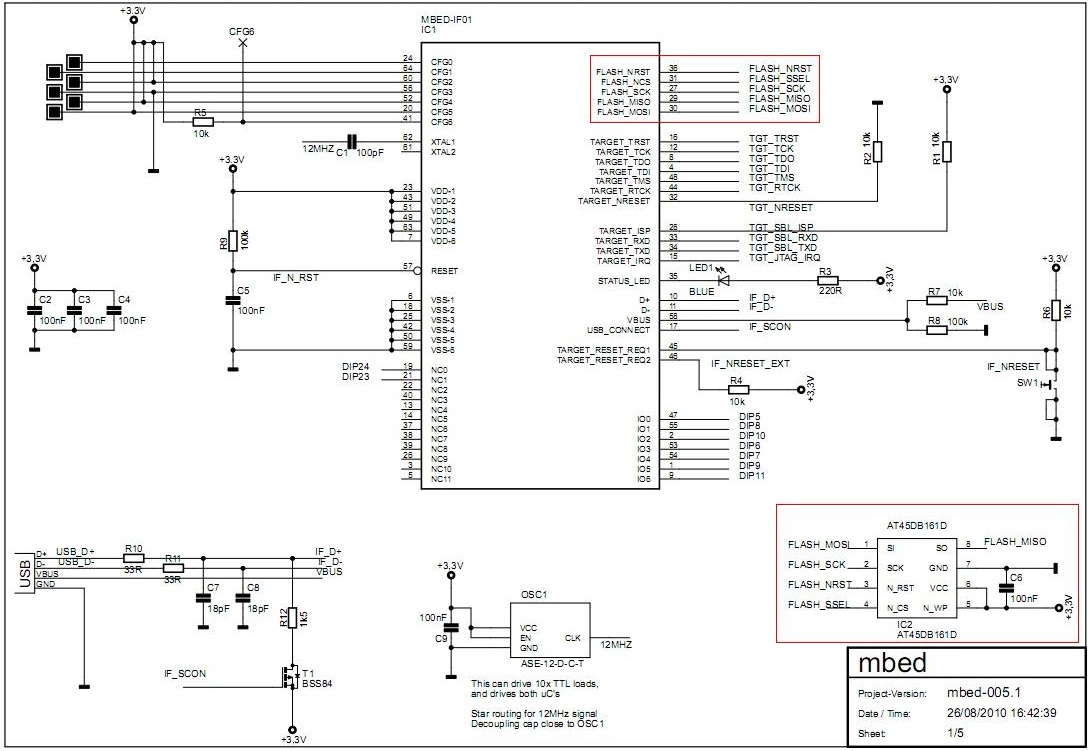
Regards,
Stas
Also the issue can be the external clock to pin 62 on the original mbed, while the on lpcmini is on pins 22 and 23. So the point here is to create extra function which will use PLL multiply based on external Crystal and not on the Clock on PIN 62. Is what I am think at the moment. I have not involve with this I just guess :)
Regards,
Stas
Has any one got 'Local file system' going ?
Or something simmilar ?
as I think that these pins (in red above) are also connected to the MAGIC Chip !!
I also want to create my own LPC1768 board.
**Ceri
@ Stas
Hi Stas,
a complete different question. Did you ever publish your project you sent to the CC Challenge. I am still interested in that. Any chance to get a copy ?
voy
AFAIK IC1 is **not** the LPC1768 but the 'magic' chip and the LPC mini does not have this chip.
Ofcourse you can connect the flash chip to the mbed but then you can also use a (micro) sdcard through the SPI interface which also removes the problem of interrupts being disabled during filetranfser to the local filesystem.
#
07 Aug 2011 . Edited: 07 Aug 2011
:) Ups
Thanks Gert for info, I did not give an attention to that.
I thought it was LPC1768 then, yes just ignore my last two posts. Just attach then cheap I2C memory and store your settings there or use the MicroSD on SPI as was mention.
Voy I can not publish it before conference, it must be unpubish work. So after conference I will share.
Regards,
Stas
#
08 Aug 2011 . Edited: 08 Aug 2011
Hi there again,
So I just look it better now and what I am guess is what show the bellow image.
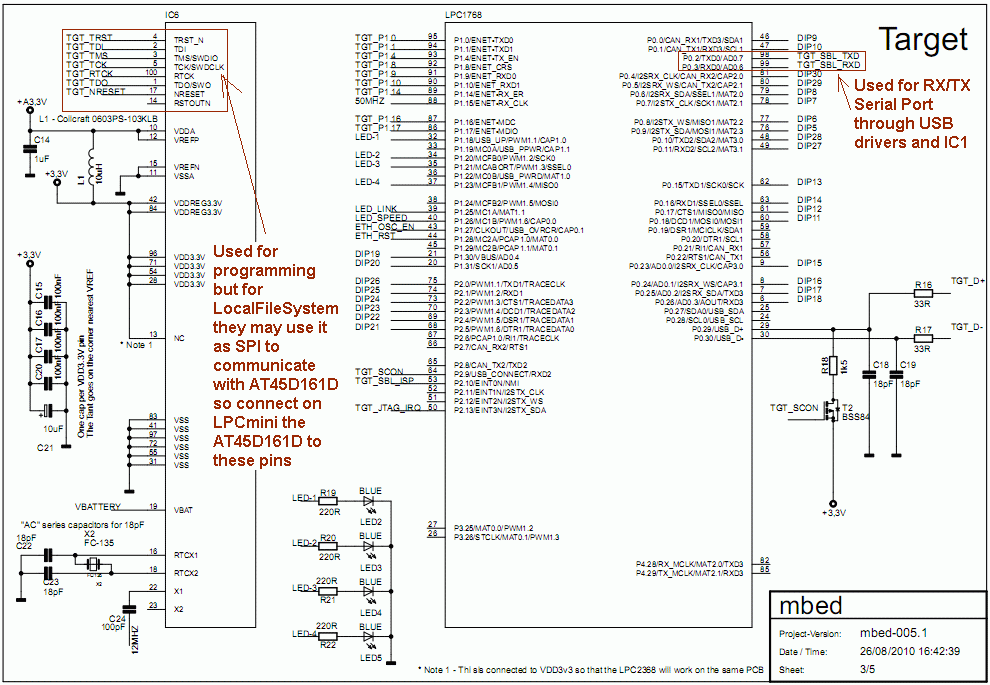
Then maybe the LocalFileSystem will work.
If you connect logic analyzer to these pins and run your code with localfilesystem suport on real mbed then you will see how they communicate as standard SPI or not. If yes then on LPCmini you just need to connect to these pins properly the AT45DB161D. If it not use standard SPI then probably we need to modify the library localfilesystem where we can attach the AT45DB161D.
Regards,
Stas
#
08 Aug 2011 . Edited: 08 Aug 2011
After looking at schemativs for the REAL MBED, (much easer on PC than my phone)
The AT45DB161D is commected to the MAGIC chip,
and is linked through the J-TAG connector,
and noot the SPI port. :(
Basicaly this means, I am sure,
No Local File System for NON MAGIC Chip LPC1768 boards.
Ceri
#
08 Aug 2011 . Edited: 08 Aug 2011
Hi Ceri,
Yes it maybe connected through JTAG but for the purpose of the direction from IC1 to LPC1768 to programm it when the firmware is stored from PC through USB on the AT45DB161D. But when you restart mbed and your code will run on the LPC1768 with LocalFileSystem it communicate with IC1 in order to get data or store data to AT45DB161D. This communication is not use JTAG because it not program the IC1 but just to inform the IC1 to redirect the the data to AT45DB161D. If this redirection is standard SPI communication then we can bypass the IC1 for reading the AT45DB161D. If it is not standard SPI then we need to find what it is.
Regards,
Stas
#
08 Aug 2011 . Edited: 08 Aug 2011
Hi Guys,
This might help answer some questions!
http://mbed.org/handbook/mbed-interface
The important points to note are :
1. The interface runs the USB disk, and the AT45
2. When a new image is save to the USB disk, it is loaded into the LPC1768 over JTAG when the reset button is pressed. The LPC1768 is alway executing from its onboard flash.
3. The interface polls (noninvasively) the LPC1768 to look for "semihost" requests - this ist he mechanism by which the LPC1768 becomes the master of the filesystem.
Hope that helps!
Cheers,
Chris
Thank you Chris!
I just remember my self many years ago with software SPI which I used.
So check this link to have an idea http://www.avrfreaks.net/index.php?module=Freaks%20Tools&func=viewItem&item_id=83
What I mean is that JTAG maybe used as standard pins when work with IC1, and it may use software SPI.
Regards,
Stas
Hello,
I wanted to know if this project was still being supporting and if the CAD files were available anywhere since MobileMe has shut down?
Thanks,
Matt
#
12 Nov 2012 . Edited: 12 Nov 2012
I second Matt's question. How goes this project? I know some people were complaining about USB issues, but was that a major problem?
This looks to be very useful, and it's is amazingly well done!
Though the pictures are extremely helpful, and I'm loving the 3d renders. It would be superb to get the CAD files link working again.
#
12 Nov 2012 . Edited: 12 Nov 2012
Okay, really nice discussion. But does anyone see an answer about the USB Bug. I don't. Until i cannot use the USB connection my two boards are useless for me and for sale.
Can anyone tell me where can I get the CAD files for this board?
I would second the request for CAD files, If you could add them to your code repo it would be fantastic!
All the best and thankyou for making these chips look a little simpler to us!
Jon
Hi guys,
May I known the current state of this project?
Thanks in advance.
Good norning Franz,
I am (as are a few others I guess)\\
are you planning os selling the LPCMini, as a product,
or just the unpopulated PCB. ?
I am very interested in getting 2 or three.
Cheers
**Ceri
#
11 Sep 2013 . Edited: 11 Sep 2013
Hi everybody
i have tested many programmers for LPC1768 but they didn't work . i tend to assemble the first circuit of this page . i need to know which electronic components are used for its usb part (By FT232RL IC). Unfortunately i can't open ".sch" file . if you have a file that is specific to see those components please send it to me .
thank you for designing Mr Achatz.
good luck.
Hello Jaap,
wish you fun with testing.
If you use OS X for it i can mail you the lpc21isp script.
Franz
Can I also get this?
my email id is neeldshah88@gmail.com
Thanks
Hello Jaap,
wish you fun with testing.
If you use OS X for it i can mail you the lpc21isp script.
Franz
I am using MAC OSx. Can you send me the isp script? I am looking for the flash.sh.
You can send me the file on neel.mlab@gmail.com
Thanks
#
02 Sep 2015 . Edited: 02 Sep 2015
Hello Franz,
can I get chip LPC1768 eagle lib?
Thank you
hi
how r u ?
i need to LPC1768 or LPC1788 library for Proteus. and TFT LCD 4.3" to 9" library ,too.
If you have them , please send me . My email : azizian7225@yahoo.com
Thank you
#
17 Mar 2018 . Edited: 23 Mar 2018
Hello Franz,
Thank you for sharing the LPCmini project with us. You have done an amazing job. Since it's licensed as [[http://www.tapr.org/ohl |TAPR Open Hardware]] and I would like to publish a modified version allowing to add also an Ethernet interface, I'm ready to fulfill a good faith obligation according to the valid rules. So could you please be so kind and let me know your e-mail address over the mbed's private message service in order to send you the new documentation in advance? Of course, the modified version is going to be licensed as TAPR Open Hardware as well.
With best regards,
Zoltan Hudak
You need to log in to post a comment






















Looks great....
Can I order some through www.achatz.nl?
Ben Zijlstra
http://benshobbycorner.nl